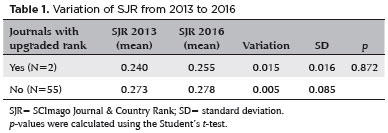

Rodrigo Pessoa Cavalcanti Lira1; Rafael Neves Moreno1; Eduardo M. Rocha2
DOI: 10.5935/0004-2749.20180071
In Brazil, Qualis-Periódicos is a system used by the Brazilian Agency for Support and Evaluation of Graduate Education (CAPES) to classify the productivity of postgraduate programs in relation to articles published in scientific journals. These journals are ranked in the descending order of quality as A1, A2, B1, B2, B3, B4, B5, and C. Bibliometric indicators are used to evaluate periodicals, taking into account the number of citations received(1).
Authors from postgraduate programs need to publish in journals that have a good classification in Qualis-Periódicos, with direct repercussions, for example, for obtaining funding for research. This contributes to a perverse logic: journals with least indicators receive the least citable articles.
In an attempt to reverse this situation, the Medicine III (surgery) evaluation area decided, as an experiment, to upgrade the Qualis-Periódicos ranking of two journals. Thus, in 2013-2016, these two journals, which according to the number of citations should be classified as B3, received an artificial upgrade to B1. The objective was to attract authors to publish their more citable articles in these journals(2).
We compared the impact factor calculated through the SCImago Journal & Country Rank 2013-2016 (SJR) between the two upgraded journals and other 55 journals with B3 rankings of Medicine III (Table 1). We concluded that the artificial upgrade of the two journals was not enough to guarantee more citations.

These data suggested that an administrative act, such as the artificial upgrade of Qualis-Periódicos ranking, was not enough to improve the citation of Brazilian journals. It may be more effective to adopt other measures, such as specialized editorial support, high-level editorial staff, prospect for good articles, restriction on the number of articles, publication of review articles, adoption of English as the standard language, extensive indexing in databases, free or low-cost publication, rigorous and speedy review and publication processes, and advertisements at large scientific meetings(3).
REFERENCES
1. CAPES. Critérios utilizados para a estratificação de periódicos [Internet]. Brasília, DF: Ministério da Educação; 2012 [citado 2018 Fev 21]. Disponível em: https://capes.gov.br/images/stories/download/avaliacao/Qualis_Medicina_III.pdf
2. Marques F. Táticas para elevar o impacto. Revista Pesquisa FAPESP. 2018 [citado 2018 Fev 21]; 263 [cerca de 2 p.]. Disponível em: http://revistapesquisa.fapesp.br/2018/01/16/taticas-paraelevar-o-impacto/
3. Cross D, Thomson S, Sinclair A. Research in Brazil: a report for CAPES by Clarivate Analytics [Internet]. 2017 [cited 2018 Feb 21]. Available at: http://www.capes.gov.br/images/stories/download/diversos/17012018-CAPES-InCitesReport-Final.pdf
Submitted for publication:
May 20, 2018.
Accepted for publication:
May 27, 2018.
Funding: No specific financial support was available for this study
Disclosure of potential conflicts of interest: None of the authors have any potential conflicts of interest to disclose